Can You Pressure Wash a Car? What You Need To Know
-
Pete Ortiz
- Last updated:
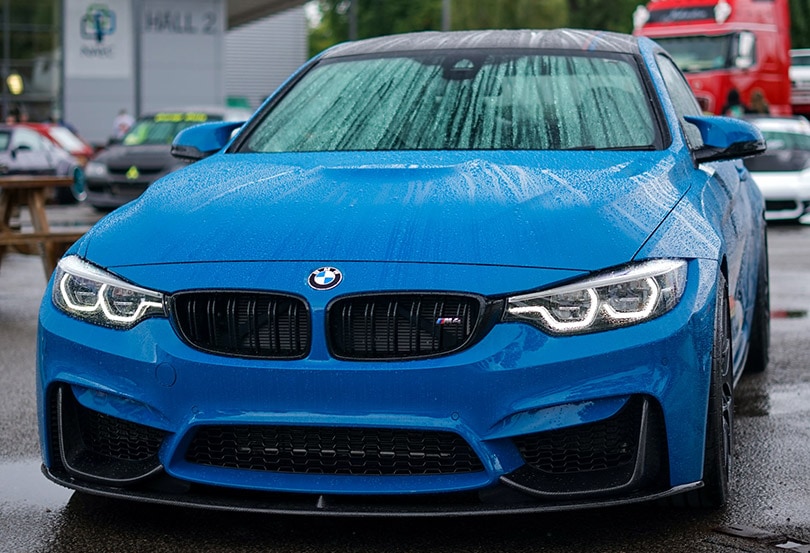
Yes, you can pressure wash your car. But should you do it? Probably not, especially if you cherish your car.
For some reason, a lot of people tend to think that a pressure washer is an essential part of car maintenance. But unfortunately, it’s not. Things can quickly get confusing if you’ve never handled such a piece of equipment before. You could key in the incorrect settings, or even apply the wrong adapters.
We know you’re probably wondering what’s the worst that could happen, so we won’t waste your time.
Reasons Why You Shouldn’t Pressure Wash A Car
Chipping Paint
The water jets that you see coming out of pressure hoses are often pressurized at approximately 100 to 200 times the air pressure that we typically experience.
In other words, we’re talking about 1500 to 3000 psi, which is more than the pressure documented as being strong enough to breach human skin. This amount of pressure will certainly be able to strip paint off a car.
The question that you ought to be asking yourself is, why would anyone think it’s okay to wash their car using a piece of equipment that’s quite effective when it comes to removing graffiti from metal fences and concrete?
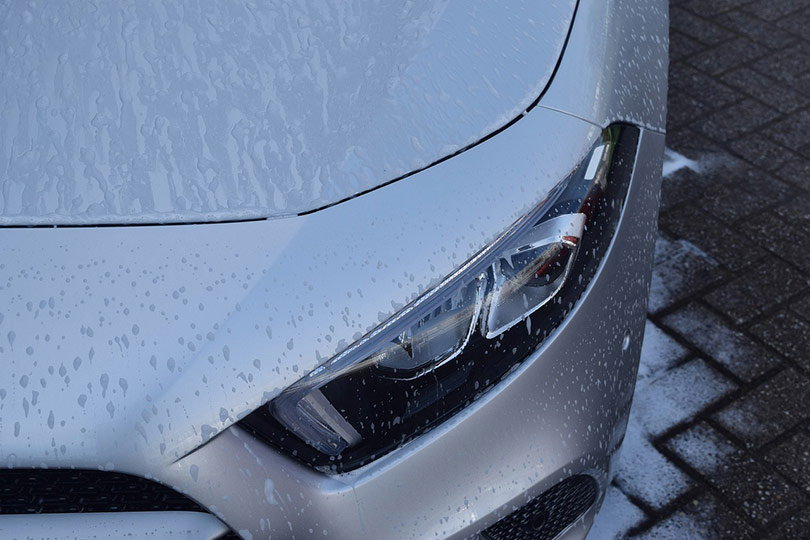
Scratching
You may think that one doesn’t have to worry about leaving residual soap behind if you’re washing your car using a pressure washer. So you won’t even bother checking—until it’s too late.
We’ve heard stories from car owners who inadvertently scratched and marred their vehicles after drying them using standing soap, before rinsing away all the residual soap.
Is It Okay To Pressure Wash a Car Engine?
The answer is the same as washing the outside of your vehicle—you can but you shouldn’t. In our opinion, the cons outweigh the pros:
You risk damaging the engine parts
We won’t even try to dispute the fact that that pressure is super-efficient if you’re looking to shift oil and dirt. However, think about all those electrical parts. We’re referring to the alternator, fuse box, distributor, and everything else that’s crucial in ensuring the car operates efficiently. Even if you choose to wrap them in plastic, there’s still the air filter and several other parts that might not be able to handle that amount of pressure.
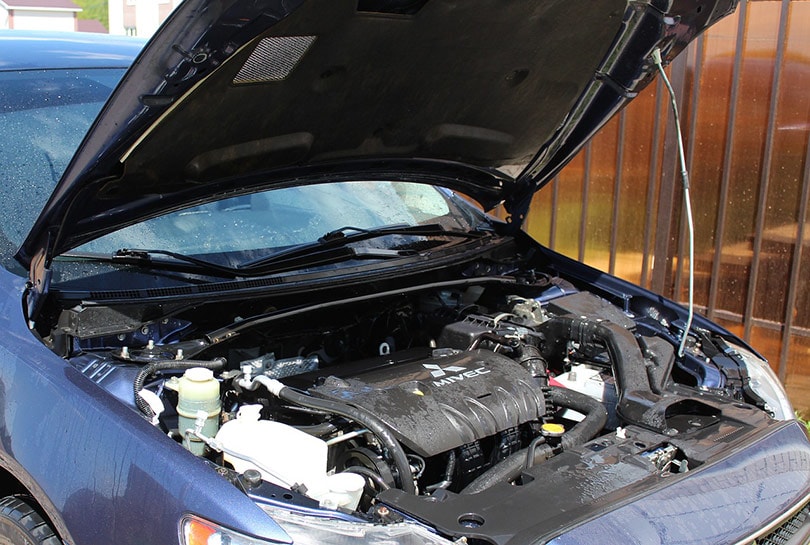
The cleaning agents could react with the engine parts
If you could use any type of cleaning agent to clean a car’s engine, manufacturers would never waste their time reminding us not to use this product or that, while cleaning our cars. Some products have chemicals that are so strong that they could easily interfere with how the engine operates.
By the way, the preferred choice is normally the biodegradable degreaser detergent, because it doesn’t have things like ammonia or bleach.
High water consumption
There’s no denying that pressure washing wastes water. You probably feel like you have more than enough, but just take a minute to look at the bigger picture. In the long run, you’ll be leaving the community and environment with less usable water, seeing as you’ll be draining it from our natural ecosystem.
Nearly all pressure washers rely on electric or gas-fuel motors to pump water, and the pressure is estimated to be 2 to 4 gallons per minute. Some people have argued that it’s actually more economical if not efficient compared to the typical garden hose, and they may be right. However, we still have better alternatives out there that are more efficient and eco-friendly.
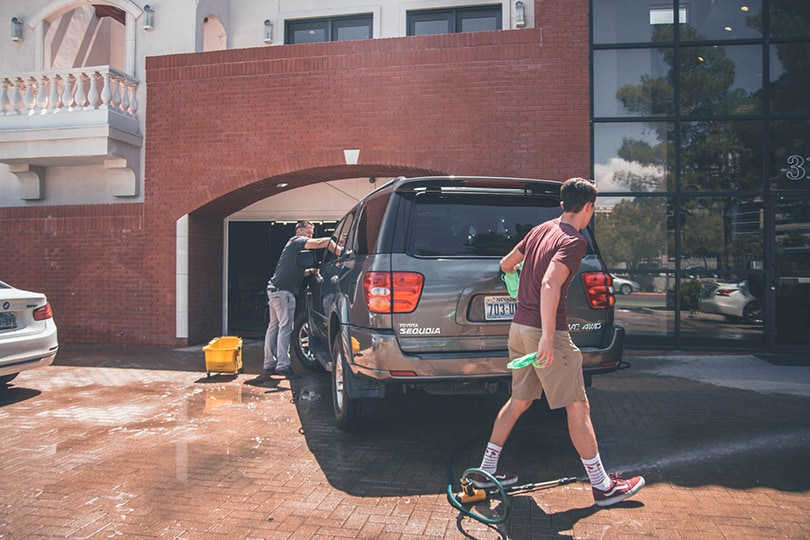
Some engine designs are more receptive to water damage
This is especially true if you’re working with an old engine. Most new cars come with engines that have protective covers and even waterproof connectors to guard all the sensitive parts, but old cars don’t have those. You’ll be surprised to learn that the pressure coming out of a garden hose is still enough to damage those parts.
Factors To Consider Before Using a Pressure Washer
If it were up to us, we would never have a pressure washer anywhere near our cars. But if you’re adamant about trying it out, this is what you need to do to protect yourself and the car.
Use an electric pressure washer
There are two types of pressure washers—the electric and the gas-powered pressure washer. The former should be a safe bet, as it doesn’t generate a pressure that’s as high as the one generated by the latter. It is estimated that a gas-powered washer can produce up to 5,000 psi, which is almost twice the amount of pressure generated by an electric washer.
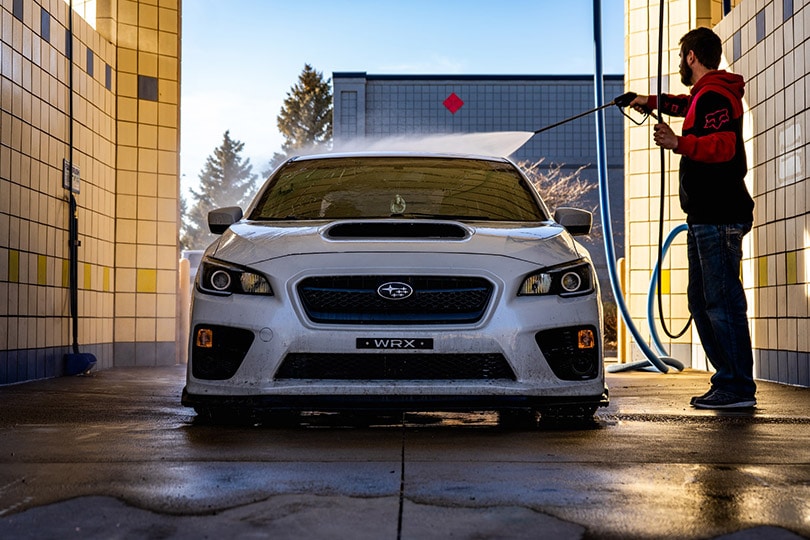
Don’t aim the nozzle too close to the vehicle
There’s no need to aim the nozzle too close when the pressure produced is powerful enough to ensure you get to all those hard-to-reach areas. Aiming the nozzle too close to the car’s could chip your car’s paint.
Also, don’t point the nozzle in the direction of the stickers, plastic emblems, or anything else that’s attached using an adhesive.
Work with the right nozzle
Typically, pressure washers come with five different types of nozzles. Those nozzles are responsible for widening or narrowing the stream of water that’s jetting out.
There are red, yellow, green, white, and black nozzles. Avoid the red nozzle at all costs, seeing as it’s been designed to produce a single stream of water. Yellow is also a terrible option because the pressure it generates is only meant to be used to remove stuck mud on hard surfaces.
If you have to remove mud from your tires or the body of the vehicle, use the green nozzle. The white one is best for general rinsing, and the black nozzle will help you efficiently apply soap.

Use the correct settings
The correct setting in our case is anything between 1200 to 1900 pounds per square inch. Water coming out of our faucets usually comes out at a pressure of approximately 80 PSI, and that of the garden hose lies somewhere between 35 to 55 PSI depending on a number of factors.
Final Words
There is a reason why states like California have tighter restrictions when it comes to the amount of water every household is supposed to consume per day. They know practices such as pressure washing a vehicle are not eco-friendly. Apart from that, the high pressure from a pressure hose can easily cause damage to your car if not used properly.
- See also: Can You Pressure Wash an Engine?
Featured Image Credit: vividdepth, Unsplash
Contents


